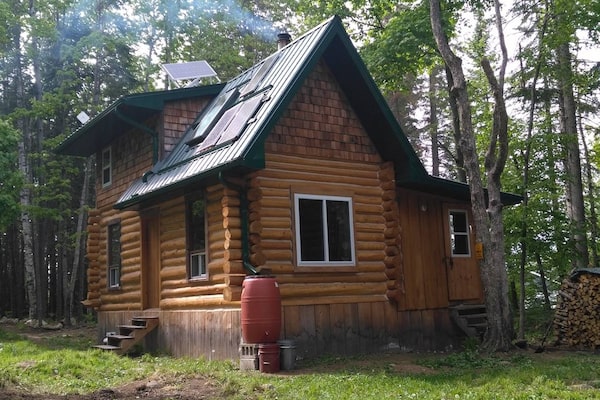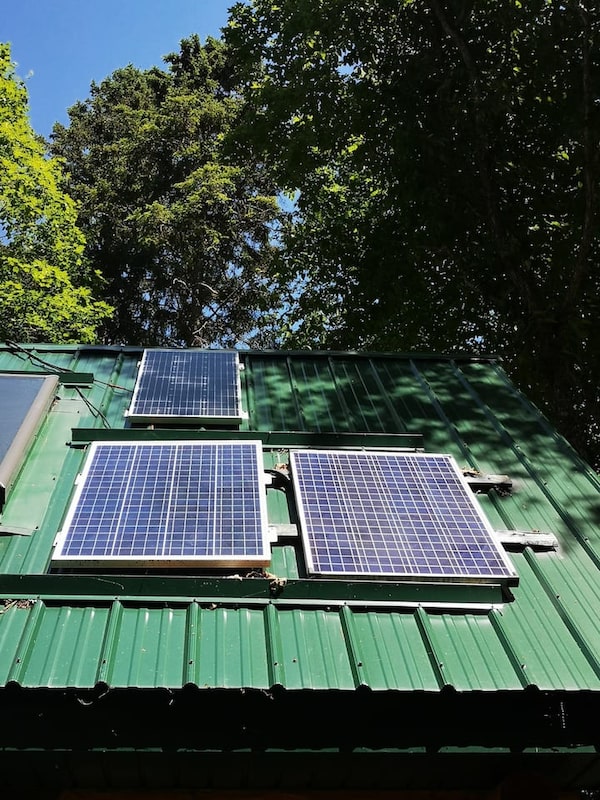
For musician Adam Ruzzo, his custom log home has limited lending options for people interested in his $319,000 asking price.Adam Ruzzo
Selling a hand-built log cabin minutes away from Ontario’s Algonquin Park should be as easy as posting up a for sale sign. But for musician Adam Ruzzo, his home comes with a big caveat: You may not be able to get a mortgage for it.
In a TikTok video that has been viewed more than 300,000 times, Mr. Ruzzo explained the limited lending options for people interested in his $319,000 asking price.
“It’s a custom log home. It might be small, but it has all the services you need and it’s an Airbnb gold mine,” he said. “I wanted a place that was simple and environmentally friendly, but that doesn’t count in the marketplace.”
The reason: The cabin is completely off the grid – no electric grid connection, no municipal water or well and not even a septic system.
Custom log cabin offers space and character
CMHC eases mortgage insurance rules, admits tightening was a mistake
Mr. Ruzzo purchased the land in 2015, in the town of Whitney, Ont. – only a few minutes from the East Gate of Algonquin Park. And starting in 2016, he lived on the site as he built his house largely by himself. It uses solar panels (with a backup generator for the winter months), a rainwater-collecting cistern, a wood stove and a composting toilet. He uses propane for his cooktop and has a backup propane wall-unit heater.
For reasons big and small, that disqualifies the property for most lenders. Or at least that’s the mainstream consensus.
“If someone doesn’t pay their mortgage and if it’s a property that doesn’t have utilities, the lender could be stuck with a property they can’t sell and can’t make themselves whole,” said Robert McLister, mortgage broker and editor at RATESDOTCA. He added that he has never done a mortgage for an off-grid home in 14 years of business. “They do turn over, they sell – they just don’t sell as fast as a standard house. There’s just not a big enough market demand for lenders to take the additional risk, that’s what it boils down to.”
Off-grid living has become a fashionable concept in recent years, highlighted by television shows on networks such as HGTV that feature builders finding spots everywhere from Hawaii to Alaska to build their dream homes. Choosing to be self-sufficient in terms of power or water can be practical depending on the remoteness of the location, or it could be done for a mix of economic and environmental reasons.
For Mr. Ruzzo, it’s a mix of the latter two reasons.
His 1.25-acre plot is inside Whitney and could be connected to the electrical grid without much difficulty. “It’s 150 feet away,” he said, referring to the closest electrical hookup.

Mr. Ruzzo's cabin uses solar panels (with a backup generator for the winter months), a rainwater-collecting cistern, a wood stove and a composting toilet. He uses propane for his cooktop and has a backup propane wall-unit heater.Adam Ruzzo
Mr. Ruzzo also chose to build off the grid after growing up in the Toronto area and experiencing first-hand the hustle and costs of city living. He paid his way through university playing guitar with a steady gig at downtown Toronto hotel bar, rubbing shoulders with professional hockey players and CEOs from the age of 19. He bought a condo in 2011. But shortly thereafter, he found himself on the road more often than not, renting out his condo and shouldering the extra expenses of insurance, condo fees and mortgage payments while he travelled.
“It dawned on me you could move up north with way less money. You could live up there, in a more peaceful way,” he said.
He started looking for communities without zoning laws and landed on Whitney. And after selling his condo, he had the money to build, though he cleared the land with a chainsaw and started peeling the logs by hand.
“This place is priceless because of all the work I put in,” he said.
Mr. Ruzzo’s video has resulted in dozens of inquiries, with several going as far as visiting the property. A couple deals have come close, so he’s confident it will sell, but the matter of financing is not a small one. He’s selling the house without a realtor, and hopes to generate enough return on his investment to buy more land that’s cheaper and more remote (perhaps in the Maritimes), and build another off-grid house.
But despite Mr. Ruzzo’s warnings about his home, there are areas of the country where off-grid isn’t as rare and some lenders are filling the niche.
“Kawartha Credit Union does offer mortgages for homes that are ‘off the grid,’ ” said Crystal Dayman, executive vice-president, marketing and corporate communications. “Some examples of mortgages we have financed include island or self-sufficient [solar-powered] homes. Kawartha Credit Union likely sees more requests for these types of mortgages because of our proximity to cottage country.”
To assess a home’s feasibility, Kawartha calculates the cost needed to hook it up to the grid in the future. For instance, it calculates approximately $1,000 a hydro pole with a maximum expenditure of $15,000 (or 15 poles), and then builds that into the loan to value ratio. This could mean a higher interest rate than that for a similarly priced property on the grid.
It’s even possible to get mortgage loan insurance from the Canada Mortgage and Housing Corp. (CMHC) if you’re on an “alternative” power source, “provided a backup power source is available,” CMHC spokesperson David Harris said.
Other options for off-grid builders or buyers can be found in British Columbia, where there are island communities that power themselves through alternative means. In some parts of the country, there are also religious communities such as Amish and Old Order Mennonites that eschew modern technology but will still use banks to run businesses and personal finances.
Ian Thomas, chief executive officer of Kindred Credit Union in Kitchener, Ont., says his institution still has several branch offices with hitching posts out front for Mennonite members who make up about 15 per cent of the union’s loan portfolio. He said Kindred has extended mortgages to Old Order Mennonite homes without a connection to the electrical grid, where the usual resale risks are ameliorated by Kindred’s knowledge of and deep connections to those communities.
Kindred also offers discounted loans to homeowners looking for environmental retrofits such as solar or geothermal systems, so Mr. Thomas said he can imagine granting a mortgage strictly along those lines as well.
“I think we would look at it. At a certain point, we might say it doesn’t fit in the box. We’re not going to get into predatory pricing – this isn’t about how much can we squeeze out of a loan,” he said, reflecting on the fact that non-traditional mortgages tend to cost more. He said that the premium would likely be more than 50 basis points above standard mortgage interest rates. “We’re not getting outrageous, we’re not three times market-rate pricing.”
Mr. McLister said that most buyers purchasing off-grid homes tend to self-finance, either through a home-equity line of credit on their primary house or doing a cash deal. That fits Mr. Ruzzo’s experience with the most serious inquiries so far.
“A couple people who are interested are in the middle of selling their current house … and I had an Airbnb investor group that was interested in buying, too,” he said.
The good news for whoever buys Mr. Ruzzo’s cabin is they won’t have to do what he did to build the dream retreat: live in a tent for nine months.
Your house is your most valuable asset. We have a weekly Real Estate newsletter to help you stay on top of news on the housing market, mortgages, the latest closings and more. Sign up today.
 Shane Dingman
Shane Dingman